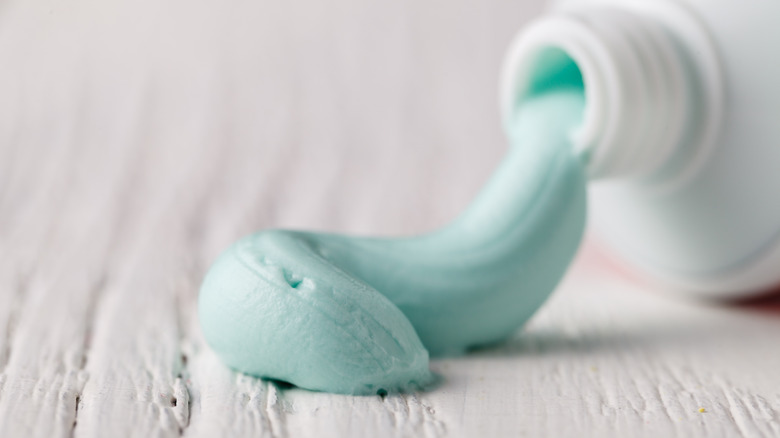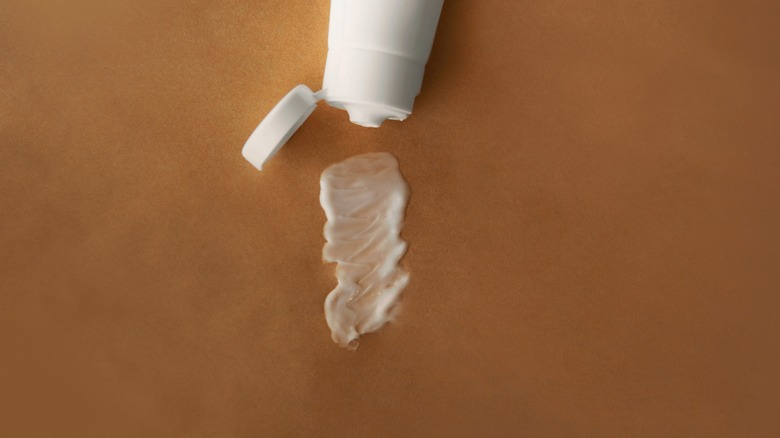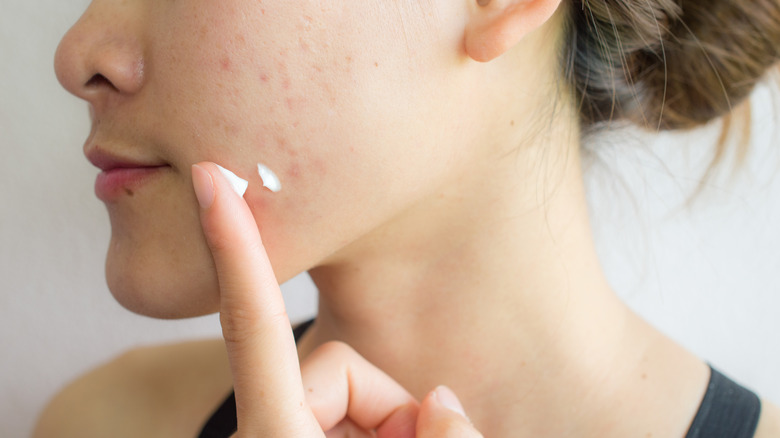Is Toothpaste On A Zit Truly Effective? (We've All Tried It)
Giant, angry pimples are always unwelcome, especially when they grow on the most noticeable parts of your face. When a massive zit shows up on your nose or the middle of your forehead, you naturally want to make it disappear as soon as possible. And what happens if you run out of pimple patches and have no way of replenishing your stash right away? If you ask your mom, she might recommend the age-old treatment backed by thousands of anecdotes dating years back: good 'ol toothpaste. Apparently, the product you use to scrub debris off your chompers also does a great job of drying out zits that grow overnight. But does it really?
You've likely already tried dabbing a dollop of toothpaste on a pimple in hopes of clearing it in a day or two. However, it turns out that doing so only does more harm than good. According to experts, toothpaste is capable of drying out zits, but it can also harm your skin in the worst of ways.
Toothpaste could cause more harm than good
Before you go and reprimand the person who introduced you to the toothpaste trick, it's worth noting that the myth originated from a time when there weren't many acne treatments available. "Many toothpastes contain ingredients that can target bacteria and help shrink and dry pimples, such as alcohol, hydrogen peroxide, and baking soda," Dr. Shadi Kourosh, assistant professor of dermatology at Harvard Medical School, told Washington Post. "It's understandable that people may have tried this as a home remedy, especially in the days before we had better options for acne spot treatments."
Using toothpaste as a spot treatment can do more harm than good, though. While it can dry out zits, dermatologist Dr. Mora Gohara, shared with Cosmopolitan that it can wreak havoc on your skin barrier, the outermost layer of the skin. If that happens she says this barrier "goes into overdrive and overproduces oil to compensate, leading to clogged pores, breakouts, blackheads, and oily skin." In short: using toothpaste only messes with your skin barrier, which can then result in even more blemishes.
And besides, toothpaste is specially formulated for teeth, and not the skin. Your teeth are obviously much tougher than your skin, making them able to withstand all the potent ingredients found in toothpaste. Your skin, on the other hand, is much more delicate, even if it's not the overly sensitive or reactive type. It could still experience irritation and increased dryness when exposed to ingredients not meant for it.
Spot treatments that do work
We are long past the time when effective acne treatments were contained within the four walls of the dermatologist's office. Spot treatments are now readily available and accessible. Plus, many of them even cost around the same as a tube of toothpaste.
For fool-proof pimple zapping, you can experience better results by using products with benzoyl peroxide or salicylic acid in them. Benzoyl peroxide has long been touted for its acne-killing capabilities, including drying out zits and unblocking pores. "Benzoyl peroxide is so effective and reliable for acne because it works via several different mechanisms at once," dermatologist Dr. Jessica Krant explained to Allure. "It is both antimicrobial, killing bacteria and other organisms, and an exfoliant, helping to unclog pores and gently debride the surface layer of skin." Meanwhile, salicylic acid does wonders when it comes to exfoliating the skin. Healthline notes that not only can it scrape off acne-causing bacteria, but it can also shed dead skin cells to reduce redness and make way for a fresher complexion.
If you're adamant about using at-home treatments, however, you may want to try tea tree oil, aloe vera, and green tea extract instead. Tea tree oil is found to be effective in reducing inflammation, as pointed out by Medical News Today. And aloe vera works to smooth skin while green tea can reduce acne-causing sebum production.


